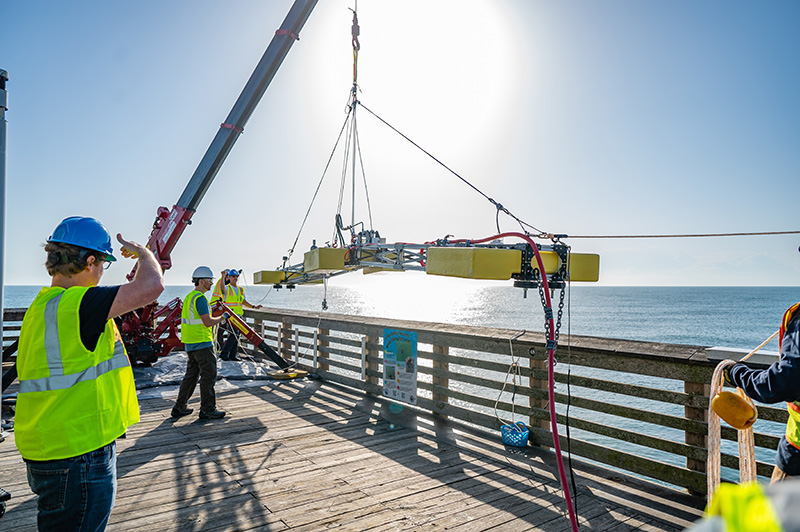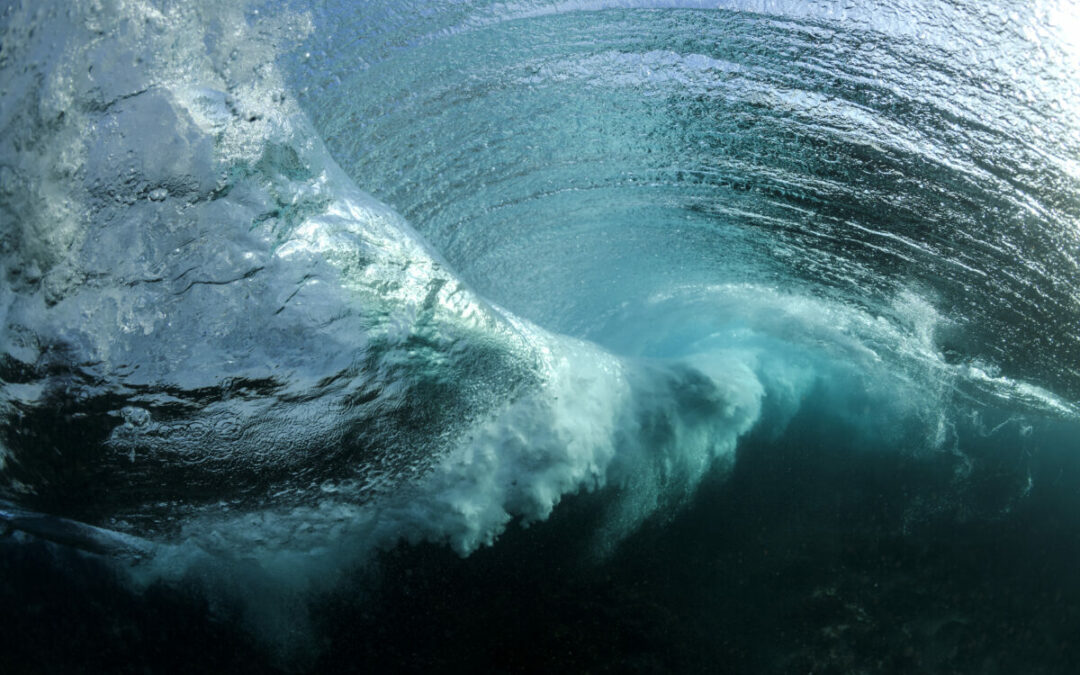The U.S. Department of Energy (DOE) recently awarded $12 million to the Atlantic Marine Energy Center (AMEC) as part of the Bipartisan Infrastructure Law to advance AMEC’s development and testing of innovative wave, tidal, and ocean current technologies. AMEC is one of four DOE National Marine Energy Centers. It was established in 2021 with an initial funding award of nearly $10 million to address the ongoing needs for research, development, and testing in support of wave, tidal, and ocean current energy and Powering the Blue Economy applications. The Coastal Studies Institute is a founding member of the consortium, along with the University of New Hampshire, Stony Brook University, and Lehigh University.
With the most recent round of funding, East Carolina University received $2.4 million of the $12 million award to facilitate research, improve facilities, and provide workforce development to support the Coastal Studies Institute’s role in AMEC.
“This critical funding invests in multidisciplinary research and infrastructure for our testing platform at Jennette’s Pier in Nags Head to enhance environmental monitoring and observation equipment necessary for developing responsible and innovative solutions to power North Carolina’s Blue Economy and beyond,” explains AMEC Co-Director George Bonner.

Personnel from CSI, NCROEP, and the National Renewable Energy Lab (NREL) deploy a wave energy converter from the side of Jennette’s Pier in Nags Head, NC.
Bonner is also the Director of the North Carolina Renewable Ocean Energy Program (NCROEP) and is excited that new and ongoing research efforts made possible by the award will “leverage collaboration across existing NCROEP partners as well as strengthen collaboration with AMEC partners to address critical stakeholder engagement and advance safe and environmentally responsible solutions.”
One example of these collaborations is highlighted by Dr. Mo Gabr (NC State University) who is leading a research task to improve moorings for wave energy converters.
“The collaboration between NCSU, CSI, NCROEP, University of North Carolina-Charlotte, and Lehigh University, under the AMEC umbrella, marks a pivotal step in advancing marine hydrokinetic energy in the United States. This multi-institutional partnership combines cutting-edge expertise in engineering, science, and technology to tackle one of the most critical challenges in the sector—anchoring and mooring energy devices in diverse and often unpredictable marine environments,” says Gabr.
“Through this innovative collaboration, we are developing anchoring and mooring solutions that support safe, reliable, and cost-effective deployment of marine hydrokinetic systems paving the way for a new frontier in clean energy that will contribute to the future of U.S. energy independence” he explains.
Other examples of research funded by this award include techno-economic assessments and stakeholder engagement to reduce environmental risks and provide solutions that address competing needs and demands in the coastal zone.
“Through our research and teaching, we hope to initiate or continue conversations and collaboration with coastal communities, maritime industries, and regulators to help move the marine energy industry forward while serving the needs of our communities in a socially and environmentally responsible manner,” explains AMEC Associate Director Lindsay Dubbs.
CSI, through Dubbs, will lead AMEC’s community benefits plan to ensure that research and development innovations positively impact the American public. Work under this plan is expected to advance diversity, equity, inclusion, and accessibility; contribute to energy equity; and invest in America’s workforce.
CSI and AMEC will also continue to grow the marine energy community in the region through this award. Future plans include increased communications and opportunities for learning with all groups, from the general public to graduate students, and K-12 students to life-long learners. Those interested in learning more or becoming involved are encouraged to look for updates.

Stakeholder engagement and community outreach will play a crucial role in next steps of AMEC work.



 Based at the Coastal Studies Institute (CSI), the North Carolina Renewable Ocean Energy Program (NCROEP) advances inter-disciplinary marine energy solutions across UNC System partner colleges of engineering at NC State University, UNC Charlotte, and NC A&T University. Click on the links below for more information.
Based at the Coastal Studies Institute (CSI), the North Carolina Renewable Ocean Energy Program (NCROEP) advances inter-disciplinary marine energy solutions across UNC System partner colleges of engineering at NC State University, UNC Charlotte, and NC A&T University. Click on the links below for more information. ECU's Integrated Coastal Programs (ECU ICP) is a leader in coastal and marine research, education, and engagement. ECU ICP includes the Coastal Studies Institute, ECU's Department of Coastal Studies, and ECU Diving and Water Safety.
ECU's Integrated Coastal Programs (ECU ICP) is a leader in coastal and marine research, education, and engagement. ECU ICP includes the Coastal Studies Institute, ECU's Department of Coastal Studies, and ECU Diving and Water Safety. The ECU Outer Banks campus is home to the Coastal Studies Institute.
The ECU Outer Banks campus is home to the Coastal Studies Institute.

